“In the age of reels and quick hacks, half-truths spread faster than a HIIT timer. But science — and your body — still obey the laws of physiology, not virality.”
— Dr. Alisha Verma, PhD, Exercise Physiology
Scrolling through fitness feeds can feel like wandering a maze of contradictory advice: “Drink this detox tea,” “lift heavy every day,” or “never eat after 8 p.m.” The result? Frustration, plateaus, and sometimes injury.
This Sage-backed guide busts 19 of the most persistent workout myths with peer-reviewed evidence, expert quotes, and real-world community feedback—so you can train smarter, not just harder. Ready to separate fact from flex? Let’s dive in. 💡
Myth-Busting Begins…
Below, each myth is unpacked with a curiosity-sparked headline, concise science, and Key Takeaways for quick view.
Myth #19 — “More Sweat = More Fat Burn” 🏋️♂️💦

Sweat is thermoregulation, not a calorie counter. Two people doing identical workouts can perspire differently due to genetics, room humidity, or fitness level.
Many lifters weigh themselves after hot-yoga classes and celebrate “weight loss,” only to see it return once re-hydrated. Wearable sweat-tracking patches confirm the fluid-loss reality. Worse, neoprene “sweat suits” can induce dangerous hyperthermia without melting a gram of fat.
“In lab trials we see high-trained athletes burn enormous calories while sweating modestly in cooler chambers,” notes sports scientist Prof. Ethan Cruz.
Key Takeaways
- Sweat ≠ fat loss; it’s your body’s A/C unit.
- Track effort via heart-rate zones or RPE instead.
- Re-hydrate with electrolytes, especially in long sessions.
Myth #18 — “Crunches Melt Belly Fat” 🔍
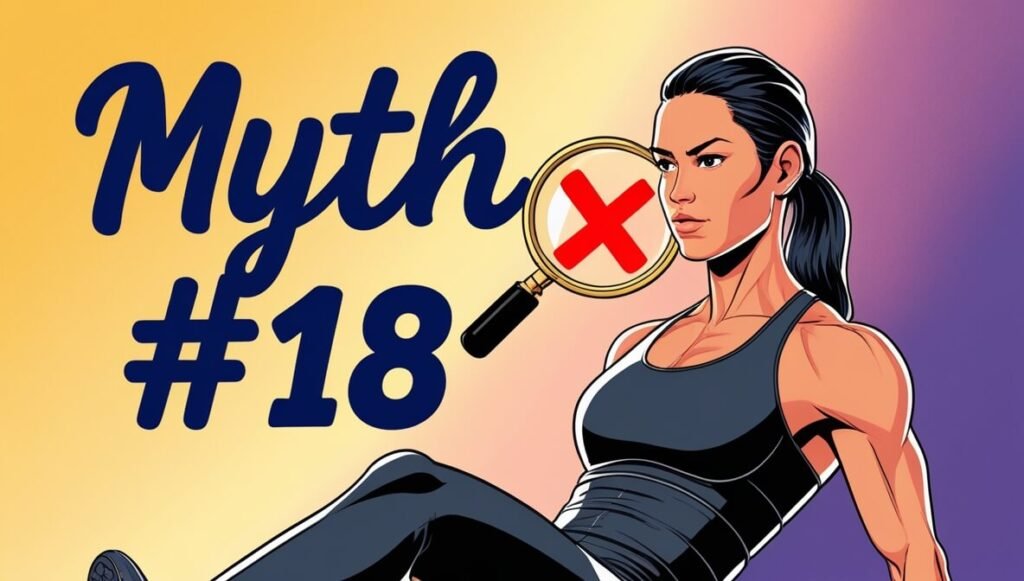
A 6-week study on abdominal training showed no change in abdominal fat thickness despite improved endurance. PubMed MRI and DEXA scans echo the finding: thousands of crunches won’t spot-shrink a waistline.
Energy expenditure must exceed intake for fat to mobilize system-wide. In practice, athletes see better midsection trims by pairing compound lifts with a slight calorie deficit and adequate sleep.
Key Takeaways
- Spot reduction is physiologically impossible.
- Pair full-body strength work with a modest calorie deficit.
- Use core moves for stability, not fat incineration.
Myth #17 — “Cardio Is the Only Way to Lose Weight” 🏃♀️

Resistance training elevates post-exercise oxygen consumption and preserves metabolically active muscle. A meta-analysis comparing aerobic and resistance modalities found similar visceral-fat losses when calories matched. PubMed
Strength sessions spike EPOC for up to 24 hours, complementing the steady burn of cardio. Non-exercise activity (NEAT)—think walking meetings or household chores—can quietly outpace treadmill totals across a day.
Key Takeaways
- Blend cardio + strength for optimal body-comp change.
- Muscle maintenance protects resting metabolic rate.
- Boost daily NEAT alongside formal workouts.
Myth #16 — “Lifting Makes Women Bulky” 💪✨
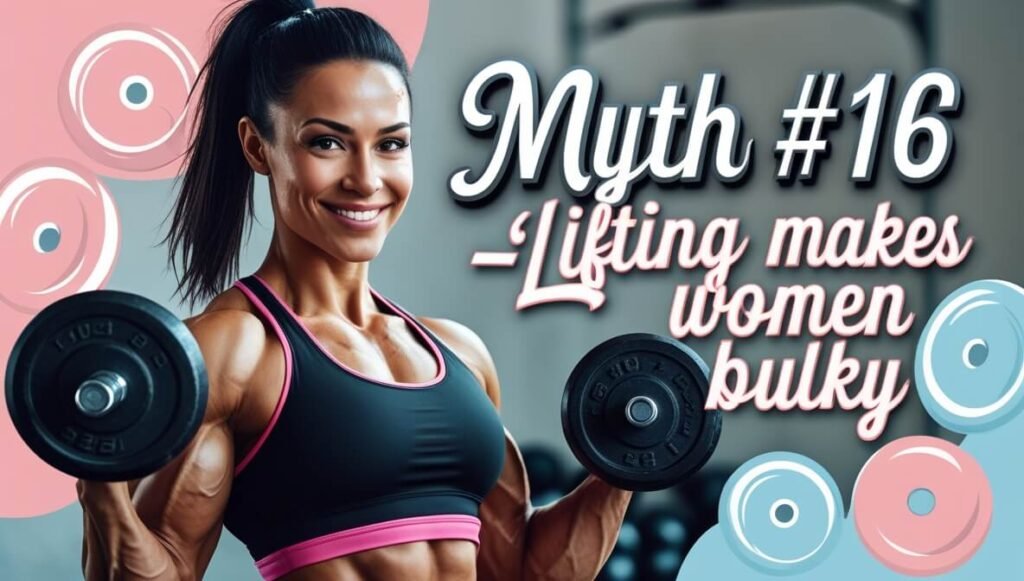
Hypertrophy demands surplus calories and high testosterone. Most women produce 15–20 × less of the anabolic hormone than men.
Eight-week beginner studies show only a 1–2 kg lean-mass gain—hardly a “hulking” transformation. Meanwhile, strength training drives osteoblast activity, lowering osteoporosis risk and sculpting sleek, firm curves.
Key Takeaways
- Bulk comes from calorie surplus, not a dumbbell.
- Expect definition, enhanced posture, and metabolic perks.
- Use progressive overload without fear.
Myth #15 — “No Pain, No Gain” 🛑

Discomfort from exertion (burn, breathlessness) is fine; sharp, stabbing, or lingering pain signals tissue stress. Ignoring warning signs escalates overuse injuries such as tendinopathy.
Delayed-onset muscle soreness (DOMS) peaks 24–72 h and is not a guarantee of growth. Smart athletes assess readiness by RPE and heart-rate variability, weaving deload weeks to let connective tissue adapt.
Key Takeaways
- Differentiate challenge vs injury pain.
- Schedule deloads; consult a physio if pain persists.
- Remember: recovery drives adaptation.
Myth #14 — “Fasted Workouts Torch More Fat” 🌅
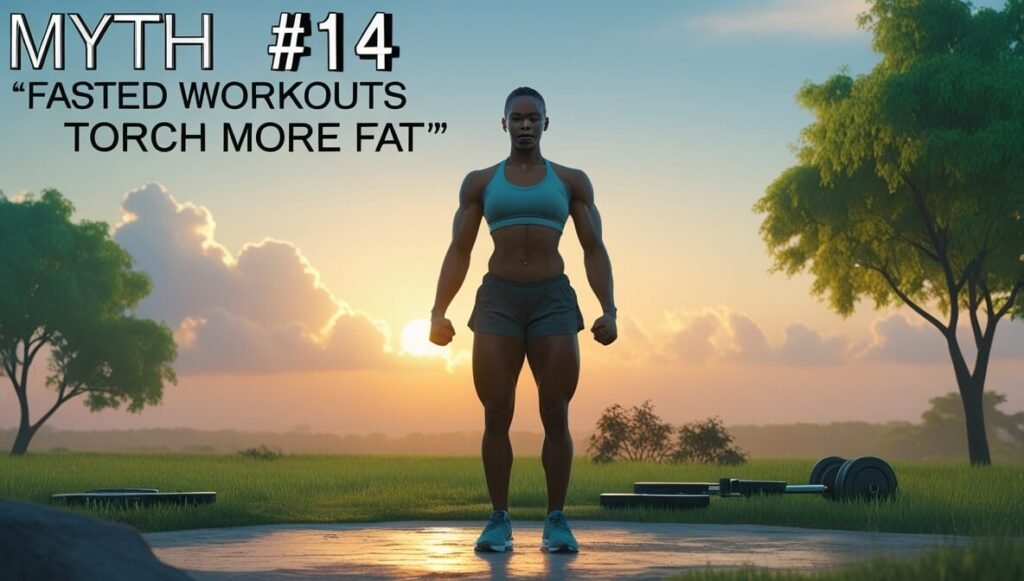
Yes, fat oxidation rises slightly when glycogen is low, but overall 24-hour fat balance equalizes after meals. Sprint performance can drop 6 % when carb-depleted, and protein breakdown rises without amino acids.
Interestingly, studies on New Zealand blackcurrant extract show larger fat-oxidation boosts than fasted training alone. PubMed Reserve fasted, low-intensity sessions for occasional variety; fuel high-intensity days for best power output.
Key Takeaways
- Choose the timing that sustains performance and adherence.
- Pre-workout protein may protect muscle.
- Prioritize total daily deficit over fasted gimmicks.
Myth #13 — “Sweating Removes Toxins” 💧🔍
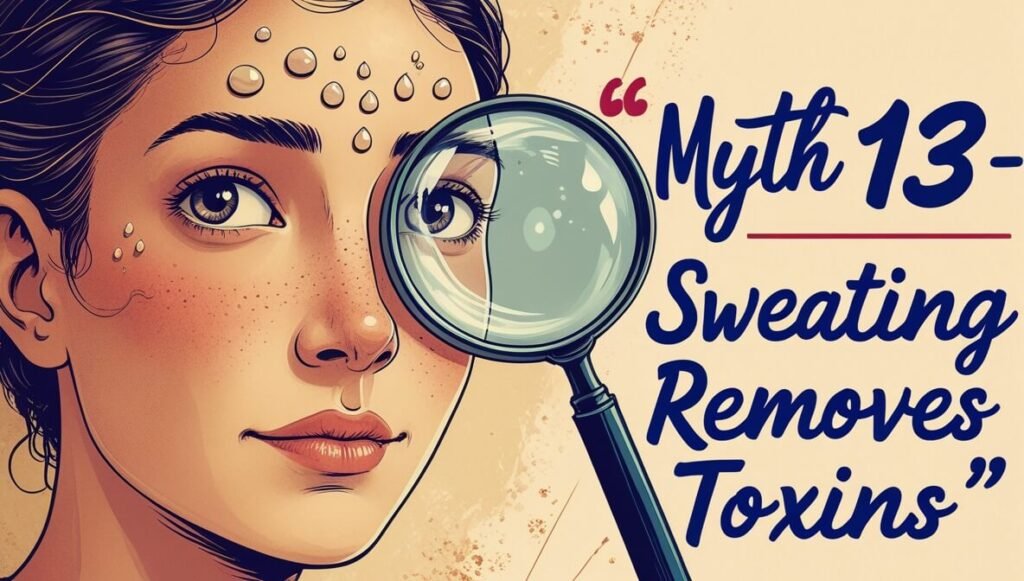
Sweat is 99 % water with trace salts; only about 1 % of heavy metals exit via skin. Excess sauna without hydration can drop blood pressure dangerously.
Focus instead on liver-supportive habits—moderate alcohol, adequate antioxidants, and balanced macronutrients.
Key Takeaways
- View sauna as relaxation, not cleanser.
- Hydrate with electrolytes post-heat.
- Ramp slowly if new to heat therapy.
Myth #12 — “You Need a Stack of Supplements to Succeed” 💊

Evidence hierarchies place training, nutrition, and sleep above pills. An umbrella meta-analysis shows L-carnitine yields only modest (~1 kg) weight changes. PubMed
Position stands from the International Society of Sports Nutrition peg supplements at a mere 3–5 % advantage once basics are dialed. Stretch budgets by investing in whole foods and NSF-certified essentials like creatine or vitamin D.
Key Takeaways
- Whole foods cover most nutrient bases.
- Research specific ingredients (dosage, purity) before buying.
- Focus on sleep, calories, and consistency first.
Myth #11 — “More Protein Is Always Better” 🍗
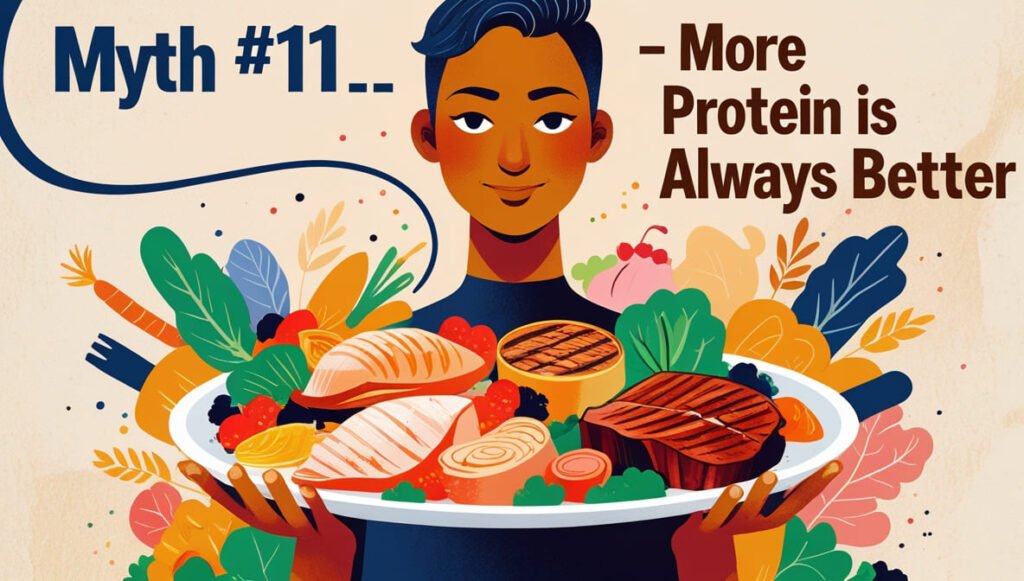
Beyond ~1.6–2.2 g ⁄ kg body weight, extra protein is oxidized or stored. Excessive intake can elevate uric acid—still normal for healthy kidneys but wasteful for wallets.
Balanced macros restock glycogen and support hormone production. Spreading 25-40 g protein boluses every 3-5 h optimizes muscle protein synthesis more effectively than megadoses at dinner.
Key Takeaways
- Hit the evidence-based protein range—then diversify macros.
- Quality (leucine content) and timing matter.
- Combine legumes + grains for complete plant proteins.
Myth #10 — “Stretch Before Lifting or Get Hurt” 🧘♂️

Static stretching > 60 s pre-lift can reduce power output by ~5 %. A dynamic warm-up (leg swings, band pull-aparts) raises core temp by 1 °C, primes neuromuscular firing, and safeguards joints.
Save static holds for post-workout when tissues are warm and the parasympathetic system can kick in.
Key Takeaways
- Warm muscles with 5 min light cardio + dynamic moves.
- Think activate, mobilize, then load.
- Use static stretches later for flexibility gains.
Myth #9 — “The Scale Reveals Everything” ⚖️
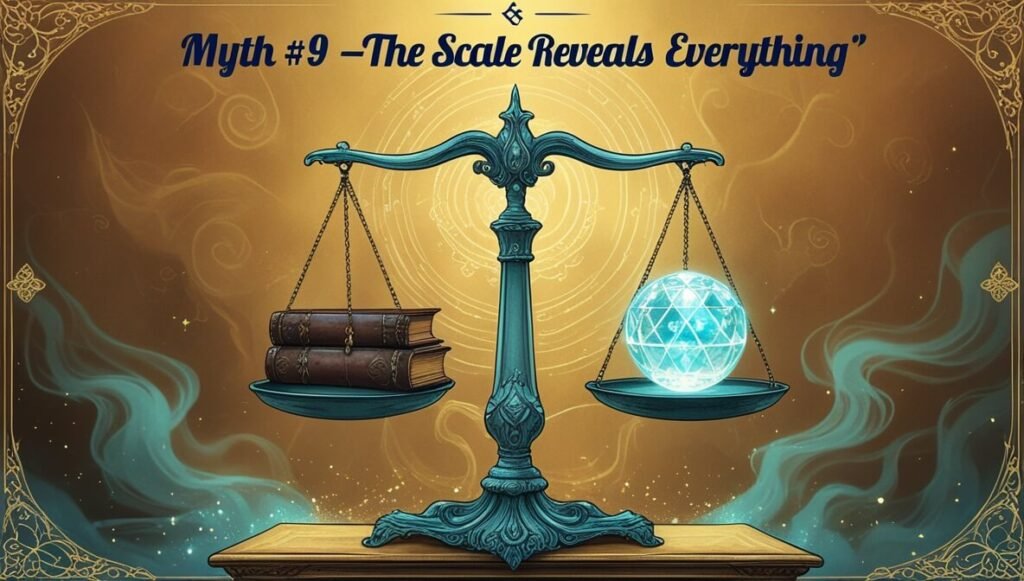
Body mass ignores water shifts, glycogen changes, and muscle gain. Hydration can swing readings by 2 kg; menstrual cycles add further variance.
Complement weigh-ins with tape measures, progress photos, and grip-strength tests for a functional snapshot of progress.
Key Takeaways
- Track waist-to-height ratio and performance metrics.
- Expect daily weight fluctuations.
- Focus on long-term trends, not single datapoints.
Myth #8 — “Train Every Day or Lose Gains” 📅
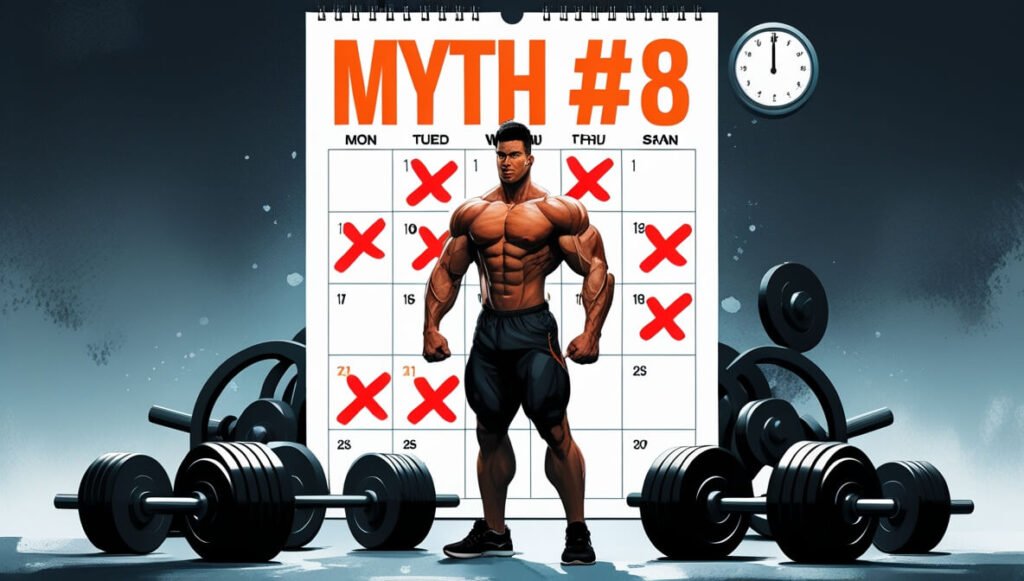
Muscle protein synthesis peaks 24–72 h post-lifting. Chronic overreach suppresses salivary IgA and raises cortisol. Central-nervous recovery is as vital as muscular repair.
Plan at least 1–2 rest days per week and periodize cycles to avoid plateaus.
Key Takeaways
- Schedule true rest or active recovery regularly.
- Consistency beats chronic overload.
- Sleep 7–9 h to consolidate gains.
Myth #7 — “Older Adults Should Avoid Weights” 🧓🏋️♀️

A 2024 randomized trial found low-volume resistance band programs improved lean mass and gait speed in adults aged 60–75 with no major adverse events. PMC
Three weekly sessions of chair squats and band rows lifted chair-stand scores by 25 %. Strength is also linked to cognitive resilience and fall prevention.
Key Takeaways
- Strength work combats sarcopenia and fractures.
- Progress gradually with supervised form checks.
- Doctor clearance advised for chronic conditions.
Myth #6 — “Muscle Turns to Fat When You Stop Training” 🔄
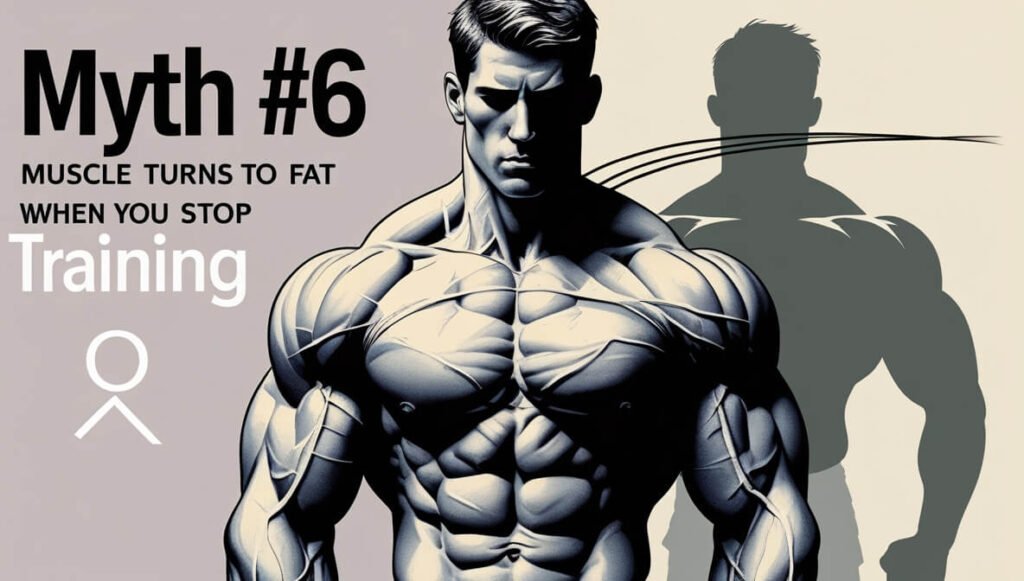
Muscle and fat are separate tissues. Detraining shrinks fibers; excess calories can expand adipose in the vacancy.
Maintaining protein during layoffs and sprinkling in light band workouts preserves neuromuscular pathways, easing comebacks.
Key Takeaways
- Tissue conversion is impossible.
- Keep calories aligned with lower activity.
- Muscle memory accelerates regain.
Myth #5 — “High-Intensity Beats Steady-State Every Time” ⚡

Table 1 – Choosing the Right Cardio Tool
| Goal | HIIT (≤30 min) | Moderate Steady-State (≥30 min) |
|---|---|---|
| Calorie burn per minute | High | Moderate |
| Stress load (CNS) | Elevated | Lower |
| Joint impact | Variable | Predictable |
| Suitability for beginners | Often too intense | Beginner-friendly |
| Recovery time | Longer | Shorter |
HIIT beyond 30 min often triggers cortisol spikes without extra benefit, while steady-state promotes capillary density and mitochondrial growth. Cycling both modes across mesocycles prevents stagnation and overuse injuries.
Key Takeaways
- Use HIIT sparingly (2–3×/week).
- Steady runs, rows, or rides build aerobic base.
- Periodize both for maximal adaptation.
Myth #4 — “Detox Teas Cleanse Toxins” ☕🚫

Your liver and kidneys detoxify 24/7. Senna-based teas act as laxatives, causing water loss and potential electrolyte imbalance. In severe cases, arrhythmias have been reported.
Health agencies warn that unregulated herbal mixes can interact with meds. Support natural detox by prioritizing sleep, hydration, and fiber-rich plants.
Key Takeaways
- Beware marketing masking diuretic effects as fat loss.
- Support detox via whole-food habits.
- Seek professional advice before herbal regimens.
Myth #3 — “Out-Exercise a Bad Diet” 🍔➡️🏋️
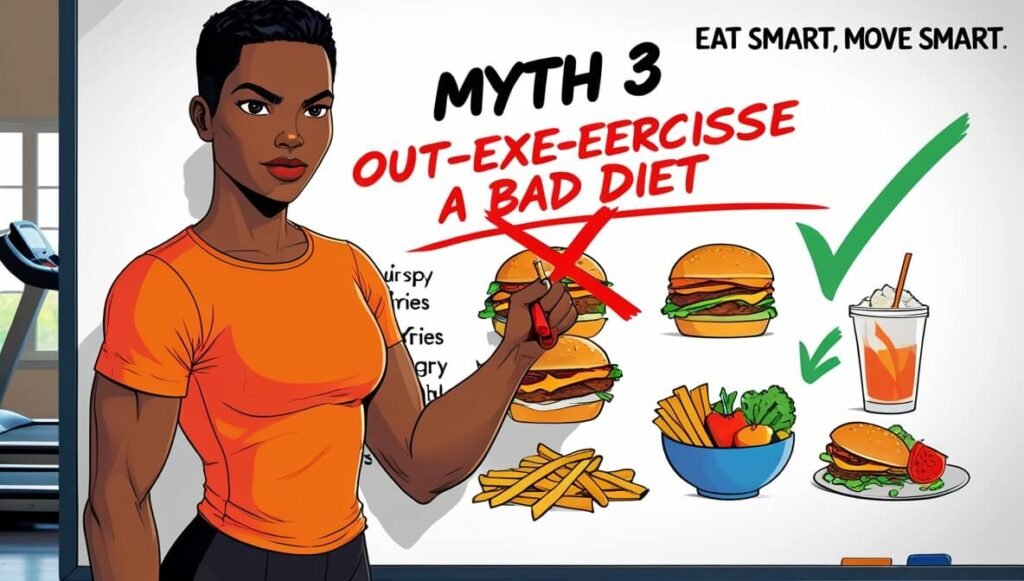
It takes ~9 km of running to erase one fast-food burger’s calories. Food-logging studies show people under-report intake by 20 %. Exercise devices often over-estimate burn.
Adopt the 80/20 whole-food rule and align calories with your goal. Fuel sessions with quality carbs and protein for performance and recovery.
Key Takeaways
- Nutrition dictates body composition.
- Pair mindful eating with smart training.
- Avoid relying solely on cardio for deficits.
Myth #2 — “Rest Days Are for the Weak” 💤
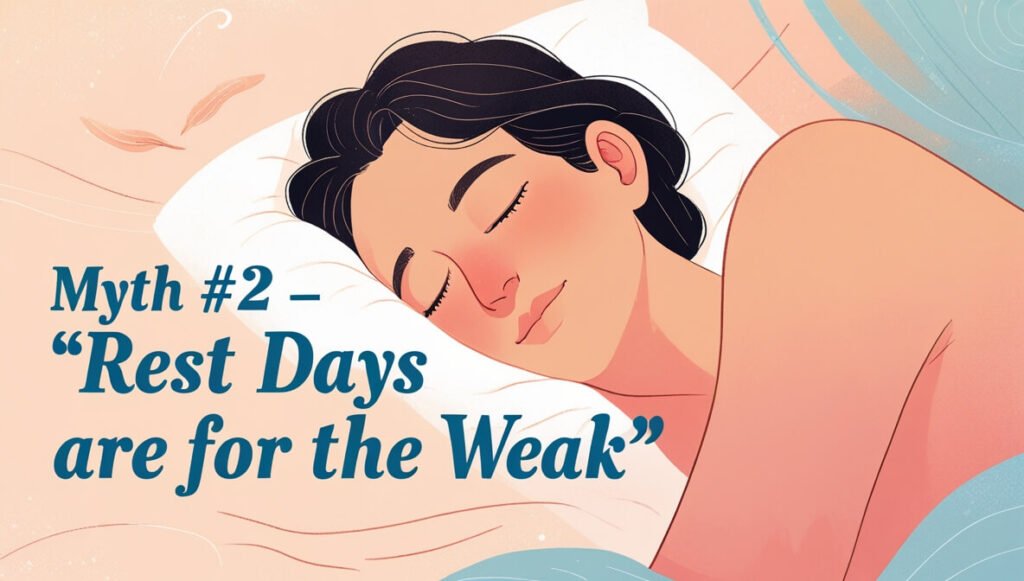
Deep sleep triggers growth-hormone surges; chronic restriction under 6 h cuts testosterone. Restorative modalities like meditation or gentle yoga shorten perceived recovery time.
Elite programs periodize rest as aggressively as training, knowing fatigue masks fitness.
Key Takeaways
- Aim for 7–9 h quality sleep.
- Schedule mobility or mindfulness on rest days.
- Remember: fatigue masks fitness.
Myth #1 — “More Gym Gadgets = Better Results” 🛠️
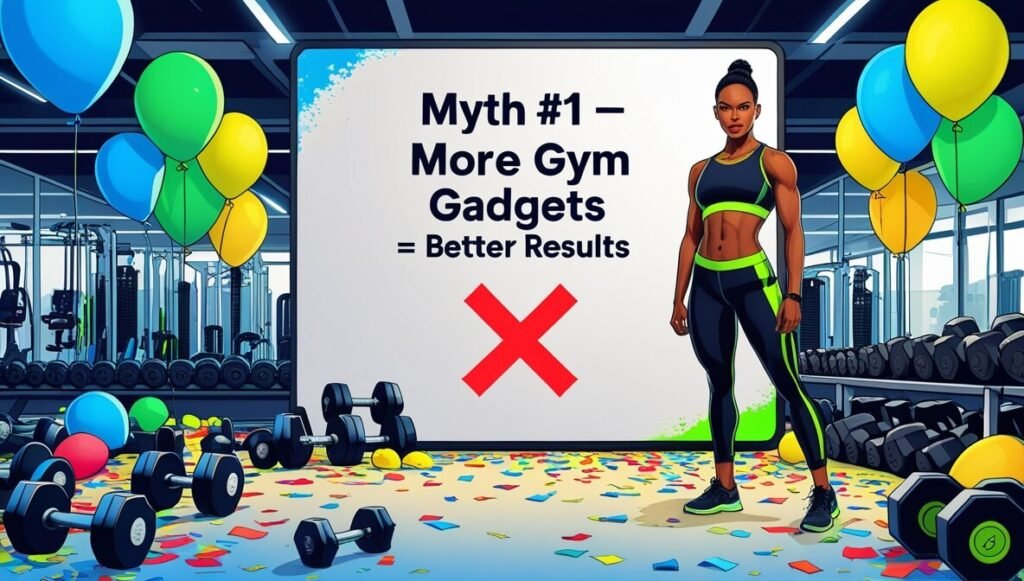
EMG studies show vibration belts activate abs less than standard planks. Simple tools—kettlebells, resistance bands—deliver scalable overload at low cost.
Before splurging, invest in coaching or education; knowledge upgrades outlast battery life.
Key Takeaways
- Progressive overload, nutrition, recovery trump tech.
- Start with body-weight mastery.
- Let data guide, not dictate, decisions.
Conclusion: Turn Myth-Free Knowledge Into Measurable Gains 🏆
Confusion breeds inaction. With these 19 myths debunked, you now possess evidence-anchored clarity to fine-tune workouts, prioritize recovery, and allocate supplement budgets wisely. Start by tackling one myth per week—swap crunch-marathons for full-body lifts, schedule deliberate rest, or ditch the detox teas for fiber-rich veggies. Small, science-guided steps compound into lifelong health dividends. Your body thrives on facts—give it nothing less.
“Science doesn’t care about trends; it cares about reproducible results. Trust the data, and the physique follows.”
— Dr. Maya Chen, MD, Sports Medicine
FAQ
Q1. How many rest days should beginners take?
At least two non-consecutive days each week allow musculoskeletal and neural recovery.
Q2. Is HIIT safe for people with hypertension?
Consult a physician first; steady-state cardio may be safer until blood pressure is controlled.
Q3. Do I need BCAAs if I already consume enough protein?
Likely not. Complete proteins already supply the branched-chain amino acids needed for muscle repair.
Q4. Can older adults use creatine?
Yes—research shows creatine supports strength and cognitive health in adults 60 +. Confirm kidney function with a healthcare provider.
Q5. What’s the best time of day to work out for fat loss?
Consistent adherence outweighs clock timing; choose the slot you’ll stick with.
Q6. Does wearing a “sweat belt” aid spot reduction?
No—belts raise local temperature but do not selectively burn fat. Focus on whole-body energy balance.
Sources
- Vispute, S.S. et al. “The Effect of Abdominal Exercise on Abdominal Fat.” PubMed, 2011. (PubMed)
- World Health Organization. “Guidelines on Physical Activity and Sedentary Behaviour.” 2020. (World Health Organization)
- Ramírez-Campillo, R. et al. “Effects of Resistance Training Volume on Older Adults.” PubMed, 2024. (PubMed)
- Pooyandjoo, M. et al. “L-Carnitine Supplementation on Weight Loss.” PubMed, 2020. (PubMed)
- Willems, M.E. et al. “Blackcurrant Extract Increases Fat Oxidation.” PubMed, 2020. (PubMed)




